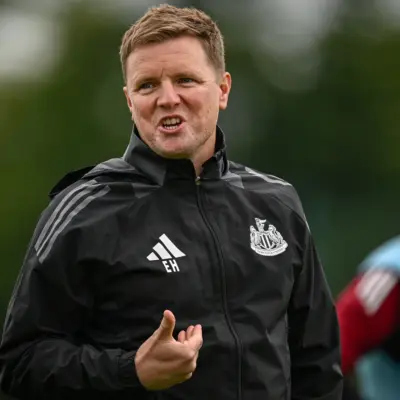MA// BLOG
CHAMPIONSHIP MANAGERS: ENGLISH COACHES ARE MASTERS OF THE SECOND TIER…

Championship managers: English coaches are masters of the second tier, so why can’t they hack it in the Prem?
You know Scott Parker. Crisp white shirt, neatly unbuttoned at the collar. A sideline swagger that says “I’m 42 but I still get asked for ID.” And a Championship squad that needs elevating to the Premier League, pref- erably with a high possession rate and the sort of slick tactical blueprint that gets pundits nodding. You know how it ends. Promotion in May. And once they’re up, invariably, he’s been sacked by Christmas.
Now he’s done it again, winning the Championship title with Burnley, his third promotion in six years, with a third different club. First Fulham, then Bournemouth, now this. Not bad going for a manager who’s never lasted more than 18 months in the top flight. And Parker’s not alone. English football is littered with coaches who can waltz through the second tier — with tactical organisation, media-friendliness, and adoration from players – but struggle when they make the leap to the Prem. There’s a whole genre of them: Championship bosses with record-breaking win streaks and bespoke set-piece routines, and absolutely no idea how to stop Spurs scoring four in 20 minutes.
Take Neil Warnock, for instance. Colin Wanker. The original Championship warhorse. He’s taken more clubs up than anyone else in English football history – Sheffield United, QPR, Cardiff among them. Eight promo- tions in total. But the Premier League? Different story. Never kept a team up. Warnock’s greatest top-flight moment was probably that time he swore blind Carlos Tevez had personally relegated Sheffield United with witchcraft (or a dodgy move to West Ham, and actually he might have had a point).
Then there’s Steve Bruce. Steady. Affable. Promoted Birmingham, promoted Hull (twice), nearly promoted Aston Villa before being derailed by a cabbage. At one point, Bruce seemed permanently available for Cham- pionship sides with big-stadium energy and dysfunctional ownership. But despite managing over 500 Premier League games, there’s not much to write home about beyond mid-table finishes and losing to his old employers Man United no fewer than 20 times as a manager.
Mick McCarthy? Same story. Took Sunderland up. Took Wolves up. Managed Ireland in the noughties with such an uncompromising style that his captain stormed home from a World Cup. But his time in the Premier League, with both Sunderland and Wolves, quickly ran into trouble. His teams couldn’t score enough, and couldn’t outplay sides that had better options across the pitch. Come to think of it, his late-career spells in the Championship haven’t been great either, except for the time he told his own fans to fuck off.
Even the more modern, progressive English coaches haven’t cracked it. Graham Potter got Brighton playing pass-and-move with full-backs inverting like origami. It was even working for them in the Premier League for a while, perhaps a sign of Potter’s earlier successes in the Swedish leagues, but then he went to Chelsea, then West Ham, and nothing good has happened since. Then there’s Chris Wilder – whose Sheffield United team briefly threatened to take over the world with overlapping centre-backs – only to get sussed out in season two, and now he’s back on Sky Sports explaining why “desire” is still the most important of all the stats.
Nathan Jones, meanwhile, had two excellent spells at Luton Town, played funky formations, and got Southampton so confused they sacked him after 95 days. If the League One playoffs go his way, maybe the same will be happening with Charlton in a few years’ time.
Which brings us back to the bigger question: why are so many English managers good at the Championship but not the Premier League? And why, despite nearly 32 years of the competition, has not one Englishman ever won the Premier League title?
One reason is the obvious one. The top clubs don’t hire English managers. Since the late 1990s, the Premier League’s biggest jobs have gone to foreign coaches, often with Champions League experience, or highly regarded tactical systems. Fergie was Scottish. Wenger, French. Guardiola, Klopp, Conte, Tuchel: the pattern is clear. The top end of the game has globalised faster than English coaching has evolved.
The Championship, by contrast, is still a manager’s league. There’s less control from above, and fewer analytics-led recruitment departments calling the shots. It rewards managers who can build squads, grind out results, get a group to stick together over a long season. It’s football with more chaos, and more autonomy. English managers have grown up in that world. They understand it. They succeed in it.
That model doesn’t carry over well. The Premier League is structured differently. Recruitment is more complex. The media pressure is sharper. The expectations are higher. And the average opponent is quite simply better. Teams who dominate the Championship often look flat in the Premier League. And unless a manager adapts quickly, he’ll be replaced, often by a continental coach with a more modern reputation and a sharper touchline dress sense.
Parker and company (that doesn’t include Vincent Kompany btw, in fact look what happened to him after he failed to keep Burnley in the Prem) find themselves in a weird limbo. Too polished for League One. Too pragmatic for the Premier League. Their style – usually possession-heavy “respect the process” stuff – doesn’t survive the leap. Promoted teams don’t get time to settle. You either adapt fast or get flattened by Bright- on’s newest wonderkid. Which is why so many clubs bin off their promotion-winning manager by Halloween and start shopping for the latest Bundesliga tactician with a goatee.
There is, perhaps, one exception. In March this year, Eddie Howe became the first English manager since Harry Redknapp in 2008 to win a major trophy (which unfortunately doesn’t include the trophy you get for win- ning the Championship or the playoff final). Could he take Newcastle to the league title? Could he break the English hoodoo and usher in a golden era for homegrown coaches, when a man from Gateshead or Slough can take a team to not only the top of the Premier League, but the finals of the Champions League and, erm, maybe even the Club World Cup? You may say I’m a dreamer, but I’m not the only one.









